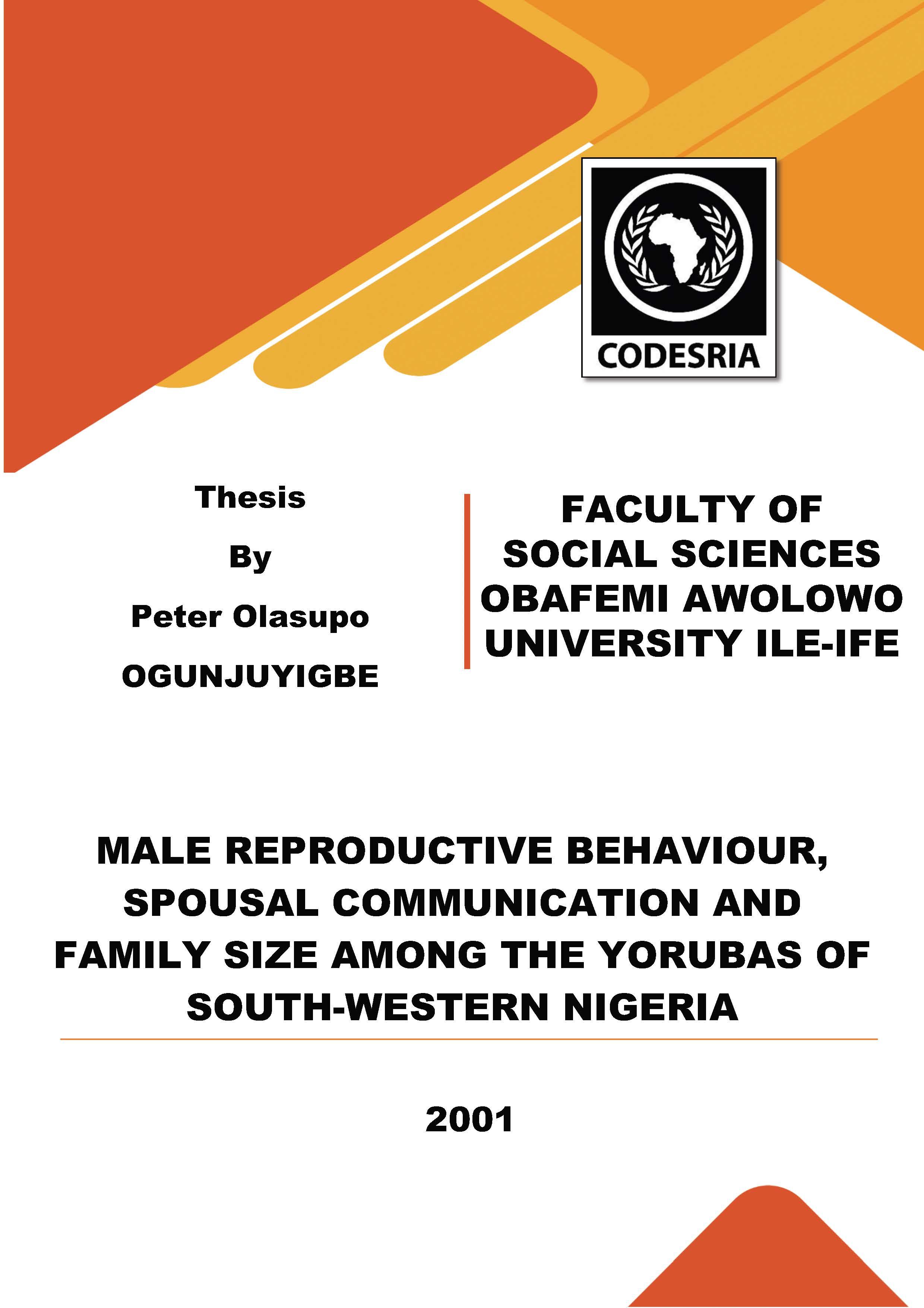MALE REPRODUCTIVE BEHAVIOUR, SPOUSAL COMMUNICATION AND FAMILY SIZE AMONG THE YORUBAS OF SOUTH-WESTERN NIGERIA
Keywords:
MALE, REPRODUCTION, FAMILY, THE YORUBAS, NIGERIASynopsis
Very little is known of the dimensions of male contribution to the problem of high population growth in Nigeria vis-a-vis fertility preferences and contraceptive use. Therefore with the recognition of male involvement as essential for the success of programmes aimed at reducing population growth, it becomes imperative to investigate the interrelationship between male reproductive behaviour, spousal communication and family size as well as the interplay of factors affecting them.
Primary data was used in this study. Data were collected from respondents selected from Osun, Oyo and Ondo states of Southwestern Nigeria. In each state, a sample size of 200 men and their wives were selected. On the whole 585 males and 715 females were interviewed in the three states. Statistical techniques used ranged from frequency distribution for all variables, bivariate analysis (cross tabulation) to multivariate analyses (logistic regression analysis and recursive path analytic technique). Data obtained from focus group discussion were used to supplement the quantitative information on individual as well as couples reproductive behaviour.
The results of the study revealed that conservative attitudes and behaviours of men with respect to reproductive issues are now changing. For instance, more than 50 percent of the male respondents are now involving their spouses in reproductive decision making and about 37 percent of them are adopting family planning methods. The results further showed that generally, among the Yorubas, while knowledge of contraceptive is high, usage is still relatively low. As high as 60 percent
of males and 54 percent of female respondents claimed knowledge of at least one contraceptive method, but the proportion of males and females using any of these methods was 32.3 percent and 27 .6 percent respectively. The study thus showed that contraceptive prevalent rate among males is higher than that of females.
The results of our findings further indicated that 26 .1 percent of male population and 23 .1 percent of female population in South Western part of Nigeria still showed preference for large number of children. Educational attainment of respondents was found to be the most important variable affecting desired family size. While respondents with no education desired as many as 5. 6 children, their counterparts with secondary education and post secondary education reported mean desired
family size of 3 .5 and 2.5 children respectively. The results of the multivariate analysis also portrayed education as having a depressant effect on family size. The study also showed a tendency towards closer relationship among married couples in Southwestern Nigeria. For instance, about 57 percent of the respondents claimed that they ate together, 69.5 percent slept together, 16.9 percent usually had leisure together and 78.6 percent usually shared confidence. It was also observed that more than 30 percent of the spouses with spousal communication had a mean family size of 4 children; whereas only 18.5 percent of spouses without spousal communication had a mean family size of 4 children.
The study therefore concludes that there is need to increase male knowledge of the need for women to participate in reproductive decision making in the family set-up. This will definitely encourage greater communication between spouses and thus will lead to joint decision making on reproductive issues. It will also remove the alienation men often feel towards family planning programmes and consequently will arouse their interest, cooperation and involvement in such programmes.
Downloads
References
Marris, P. (1966): Family and social change m Africa (Ibadan: Ibadan University Press).
Manson, K.O. (1984): The Status of Women: A Review of its Relationships to Fertility and Mortality, The Rockefeller Foundation, New York.
Mason K.O. and Taj A.M. (1987): "Differences between women's and men's reproductive goals in developing countries." Population andDevelopment Review 13(4):611-638.
Meekers, D. and Oladosu, M. (1996): "Spousal communication and family planning decision-making in Nigeria" .Population Research Institute Working Papers in African Demography, Working Paper AD96-03, University Park, Pennsylvania, Pennsylvania State University, Population Research Institute.
Mbizo, M.T. and Adamchak, D.J. (1991): "Family Planning Knowledge, Attitudes and Practices of Men in Zimbabwe" Studies in Family Planning 22(1): 31-38.
McDonald, J. (1985): A New Methodological Approach for the Analysis of WFS Current Status.
McGinn, T.; a Bamba and M. Balma (1989): "Male Knowledge, Use and Attitudes Regarding Family Planning in Burkina Faso". International Family Planning Perspective, Vol.15, No.3, pp.84-87.
Mhloyi, M.M. (1991): Fertility Transition in Zimbabwe, Paper Presented at the IUSSP Seminar on the Course of Fertility Transition in SubSaharan Africa, Harare.
Mishler, E.G. and Westoff, C.F.A. (1955): "Proposal for Research on Social Psychological Factors Affecting Fertility: Concepts and Hypothesis" in Milbank Memorial Fund, Current Research in Human Fertility, New York: Milbank Memorial Fund.
Mitra, S.N.; G.M. Kamal; C. Carpenter-Yaman and S. Harbison (1985): "Measuring contraceptive prevalence: Responses from husbands and wives in Bangladesh." Paper presented at the annual meeting of the Population Association of America, Boston, 28-30 March.






